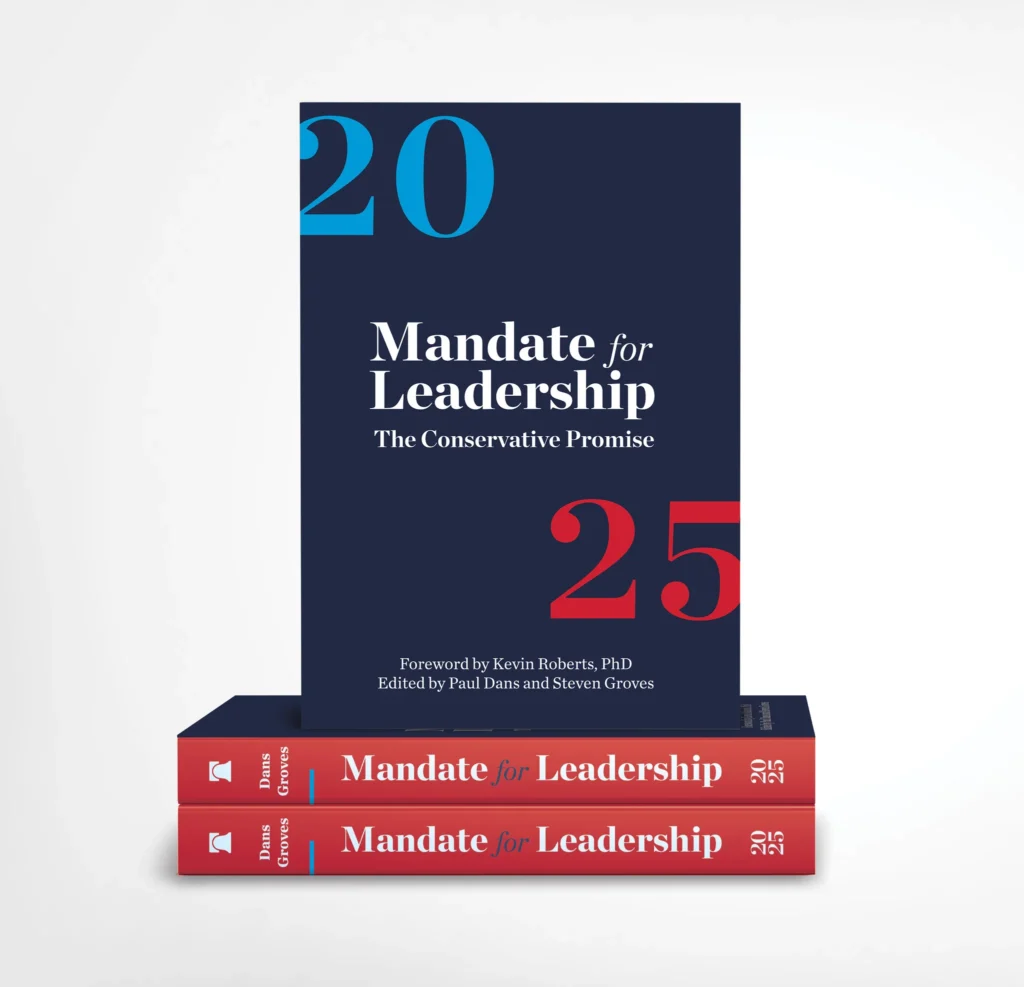When the next president takes office in January 2025, he or she will have the opportunity to reform the Federal Election Commission, which governs campaign spending and fundraising and has significant authority over activity protected by the First Amendment.
The terms of five of the six FEC members either will expire or be about to expire at that time, setting up a promising opportunity for the next conservative president.
The reforms should include removing the Federal Election Commission’s independent litigation authority and directing the U.S. attorney general to defend FEC decisions; restricting the time a commissioner may remain after his term expires; and defending the FEC’s current bipartisan, six-member structure, according to The Heritage Foundation’s new book “Mandate for Leadership 2025: The Conservative Promise.” (The Daily Signal is Heritage’s multimedia news organization.)
Heritage’s 920-page book, edited by Paul Dans and Steven Groves, includes recommendations for the next conservative president covering every federal government department and agency. The section on the FEC was written by former commissioner Hans von Spakovsky, now a senior legal fellow at Heritage who manages the leading think tank’s Election Law Reform Initiative.
The five commissioners whose terms will expire by early 2025 are Democrats Ellen L. Weintraub and Shana M. Broussard and Republicans Sean J. Cooksey, Allen Dickerson, and James Trainor III.
The three Republican commissioners have voted to oppose overregulating political activity; interpreting ambiguous and confusing provisions against candidates; and infringing on protected First Amendment activity, von Spakovsky writes.
“The president assuming office in 2025 must ensure, if the three Republican commissioners do not wish to remain on the FEC past their terms, that nominees for these positions share the views of those commissioners,” von Spakovsky writes, adding:
Also, to the extent that the president has the ability to negotiate with the Democratic Party leader in the Senate, he should try to temper any choice of the opposition party to ensure that this individual does not have extreme views on aggressive overenforcement that would severely restrict political speech and protected party, campaign, and associational activities.
The Heritage Foundation designed the 2025 Presidential Transition Project (also known as Project 2025) to avoid the pitfalls that Donald Trump faced in 2017, when the incoming president struggled to keep his promises to Americans because of stiff headwinds from a hostile federal bureaucracy that Trump often referred to as “the deep state.” Project 2025 aims to equip an incoming conservative president with policies to rein in this bureaucracy.
By law and tradition, the FEC is designed to include three members from each major party to ensure bipartisan decisions. Thus, a president of one party often will appoint a commissioner of another party. The president usually consults with the leader of the opposition party in the Senate.
The FEC term of Weintraub, a Democrat, actually expired in 2007. Commissioners are supposed to serve just one six-year term. But some stay in office until a new commissioner from the same party has been nominated by the president and confirmed by the Senate. Such overstays sometimes occur because no more than three of the members may be from the same party.
The next president should ask Congress to fix this situation, according to Heritage’s Project 2025.
“One of the most obvious changes that is needed is to end the current practice of allowing commissioners to remain as serving commissioners long after their term has expired, defying the clear intent of Congress in specifying that a commissioner can only serve a single term of six years,” von Spakovsky writes.
“The president should prioritize nominations to the FEC once commissioners reach the end of their terms and should be assisted by legislative language either eliminating or limiting overstays to a reasonable period of time to permit the vetting, nomination, and confirmation of successors,” he adds.
The FEC is an independent regulatory agency. Unlike most other government agencies, which are represented by the Justice Department in litigation, the FEC has independent litigation authority. Only if a case reaches the Supreme Court will the solicitor general defend the commission.
This status has been abused, according to Heritage’s Project 2025.
“In recent years, the FEC has failed to defend itself against litigation filed by political allies of certain Democrat commissioners,” the report says.
Four commissioners must vote to authorize the FEC’s general counsel to defend a lawsuit filed against the agency. As FEC Chairman Dickerson and two other Republican commissioners said in May 2022, “the public was treated to the scandalous spectacle of the commission—an independent agency of the United States government—defaulting in litigation before federal courts.”
Project 2025 calls for the next president to take executive action and for Congress to legislate.
“The president should direct the attorney general to defend the FEC in all litigation when there is a failure of the commissioners to authorize the general counsel of the agency to defend it,” the report says.
Congress should amend the Federal Elections Campaign Act “to remove the agency’s independent litigating authority and rely on the Department of Justice to handle all litigation involving the FEC,” the report says.
In 2021, Democrats introduced the so-called For the People Act, a proposed federal takeover of elections across the nation that would have effectively banned voter ID, allowed the controversial practice of ballot harvesting, and reduced the number of FEC commissioners to five to gain a partisan advantage for Democrats shortly after President Joe Biden took office in 2021.
“The current requirement of four votes to authorize an enforcement action, provide an advisory opinion, or issue regulations, ensures that there is a bipartisan agreement before any action is taken and protects against the FEC being used as a political weapon,” von Spakovsky writes, adding:
With only five commissioners, three members of the same political party could control the enforcement process of the agency, raising the potential of a powerful federal agency enforcing the law on a partisan basis against the members of the opposition political party. Efforts to impose a ‘nonpartisan’ or so-called ‘independent’ chair are impractical; the chair will inevitably be aligned with his or her appointing party, at least as a matter of perception.
Have an opinion about this article? To sound off, please email letters@DailySignal.com and we’ll consider publishing your edited remarks in our regular “We Hear You” feature. Remember to include the url or headline of the article plus your name and town and/or state.
The post Election Oversight That America’s Next President Should Champion appeared first on The Daily Signal.
- The Sneaky Way Deep-State Bureaucrats Advocated Censorship of Americans in 2020 - November 13, 2023
- There Is No ‘Second America’ if This One Fails - November 13, 2023
- ‘Zero Appetite’ in Israel for Cease-Fire With Hamas, Embassy Official Says - November 13, 2023
JOIN US @NewRightNetwork on our Telegram, Twitter, Facebook Page and Groups, and other social media for instant news updates!
New Right Network depends on your support as a patriot-ran American news network. Donate now



